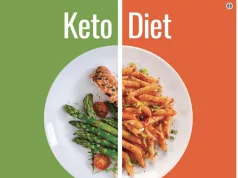Is a keto diet good for diabetics? This question has sparked debate among health professionals and individuals with diabetes alike. The ketogenic diet, a high-fat, low-carb approach, has gained popularity for its potential benefits in weight loss and metabolic health, but its suitability for those managing diabetes requires careful consideration.
This exploration delves into the complexities of the ketogenic diet for diabetics, dissecting its potential benefits and risks, and providing insights into its impact on blood sugar control. We’ll examine the science behind the diet, explore its potential advantages and drawbacks, and offer practical tips for navigating this dietary approach.
Buckle up, because this journey into the world of keto and diabetes is sure to be an eye-opener!
Ketogenic Diet Basics
The ketogenic diet, often referred to as the keto diet, is a high-fat, low-carbohydrate eating plan that has gained popularity in recent years. Unlike traditional dietary approaches that focus on carbohydrates as the primary energy source, the keto diet flips the script, emphasizing fat as the fuel of choice.
This shift in macronutrient consumption triggers a metabolic state called ketosis, which has profound implications for the body’s energy production and overall health.
Macronutrient Breakdown
The keto diet drastically alters the typical macronutrient ratio, significantly reducing carbohydrate intake while increasing fat consumption. Here’s a typical breakdown:
- Fat:70-80% of daily calories
- Protein:15-20% of daily calories
- Carbohydrates:5-10% of daily calories
This drastic reduction in carbohydrates forces the body to seek alternative energy sources.
Ketosis and Energy Production
When carbohydrate intake is severely limited, the body enters a state of ketosis. In this metabolic state, the liver converts fat into ketones, which are then used as fuel by the brain and other organs. Ketones are an alternative energy source to glucose, the primary fuel source derived from carbohydrates.
So, you’re wondering if the keto diet is the holy grail for diabetics? Well, it’s a bit of a mixed bag. While it can help with blood sugar control, it’s not a one-size-fits-all solution. And let’s be honest, who doesn’t want to lose that stubborn belly fat?
If you’re looking for the best way to tackle that, check out this article on the best diet to lose belly fat. But remember, when it comes to diabetes, always talk to your doctor before making any major dietary changes.
They’ll help you find the best approach for your individual needs, whether it’s keto or something else entirely.
The ketogenic diet is a high-fat, low-carbohydrate eating plan that forces the body to enter ketosis, using fat as its primary energy source.
Ketogenic Diet and Blood Sugar Control: Is A Keto Diet Good For Diabetics
The ketogenic diet, a high-fat, low-carbohydrate eating plan, has gained popularity for its potential benefits in managing blood sugar levels in individuals with diabetes. This diet forces the body to switch from burning glucose (sugar) to burning fat for energy, leading to a significant reduction in blood sugar levels.
Benefits of the Ketogenic Diet for Blood Sugar Control
The ketogenic diet can significantly impact blood sugar control in individuals with diabetes by reducing insulin resistance and improving glucose tolerance. By limiting carbohydrate intake, the body is forced to utilize fat for energy, resulting in a decrease in insulin production and an increase in insulin sensitivity.
This translates to improved blood sugar regulation and reduced reliance on medications.
So, you’re wondering if a keto diet is a good fit for your diabetes? It’s a hot topic, but remember, everyone’s body is different. If you’re looking to lower cholesterol, you might want to check out the best diet to lower cholesterol for your specific needs.
But, if you’re thinking about keto and diabetes, it’s always best to talk to your doctor – they’ll be your best guide in navigating the world of carbs and blood sugar!
Studies Investigating the Impact of the Ketogenic Diet
Several studies have investigated the impact of a ketogenic diet on blood sugar control in individuals with diabetes. These studies have shown promising results, demonstrating the potential of this diet to improve HbA1c levels, fasting blood glucose, and insulin sensitivity.
- A study published in the journal “Diabetes Care” in 2018 found that a ketogenic diet significantly reduced HbA1c levels in individuals with type 2 diabetes. The study followed 83 participants for 12 weeks and found an average reduction in HbA1c levels of 0.7%.
- Another study, published in the journal “Nutritional Diabetes” in 2017, investigated the impact of a ketogenic diet on fasting blood glucose levels in individuals with type 2 diabetes. The study followed 30 participants for 12 weeks and found a significant reduction in fasting blood glucose levels, with an average decrease of 25 mg/dL.
- A 2019 study published in the journal “Nutrients” explored the effects of a ketogenic diet on insulin sensitivity in individuals with type 2 diabetes. The study followed 20 participants for 8 weeks and found a significant improvement in insulin sensitivity, indicating that the ketogenic diet could help improve the body’s ability to utilize glucose effectively.
How the Ketogenic Diet Reduces Insulin Resistance and Improves Glucose Tolerance
The ketogenic diet’s effectiveness in managing blood sugar levels stems from its ability to reduce insulin resistance and improve glucose tolerance. By significantly reducing carbohydrate intake, the body is forced to rely on fat for energy, leading to a decrease in insulin production.
This decrease in insulin production, combined with the increased utilization of fat for energy, results in improved insulin sensitivity.
“The ketogenic diet promotes a metabolic shift, leading to a decrease in insulin production and an increase in insulin sensitivity, ultimately contributing to improved blood sugar control.”
Potential Risks and Considerations
While a ketogenic diet can be a valuable tool for managing blood sugar levels in individuals with diabetes, it’s crucial to acknowledge potential risks and considerations. The keto diet involves significant dietary changes, and these changes can come with some potential downsides.
So, you’re wondering if the keto diet is a good fit for your diabetes? It’s a tricky question, as it can help manage blood sugar levels in some cases, but it’s not a one-size-fits-all solution. If you’re considering it, it’s crucial to understand how to do the keto diet correctly.
This includes learning about the high-fat, low-carb approach and making sure you’re getting enough electrolytes. Check out this guide on how to do the keto diet for more info. Remember, always consult with your doctor before making any significant dietary changes, especially if you have diabetes.
It’s essential to approach the keto diet with caution and always consult with a healthcare professional before making any significant dietary changes, especially if you have diabetes.
Electrolyte Imbalances
The keto diet can lead to electrolyte imbalances, particularly in the early stages. When your body enters ketosis, it starts burning fat for energy, which produces ketones. This process can lead to increased water loss and electrolyte depletion, especially potassium, sodium, and magnesium.Electrolyte imbalances can manifest as:
- Fatigue
- Muscle cramps
- Headaches
- Constipation
- Dehydration
To mitigate these risks, it’s essential to:
- Stay adequately hydrated by drinking plenty of water.
- Consume electrolyte-rich foods, such as leafy green vegetables, avocados, and bone broth.
- Consider electrolyte supplements, especially during the initial phase of the diet.
Nutrient Deficiencies
The keto diet restricts many food groups, including fruits, whole grains, and legumes. This restriction can lead to deficiencies in essential nutrients, such as fiber, vitamins, and minerals.Common nutrient deficiencies associated with the keto diet include:
- Vitamin D
- Vitamin B12
- Potassium
- Magnesium
- Fiber
To prevent these deficiencies, it’s vital to:
- Focus on consuming nutrient-rich foods within the ketogenic framework, such as leafy green vegetables, nuts, and seeds.
- Consider a multivitamin supplement to ensure adequate intake of essential nutrients.
- Consult with a registered dietitian to create a personalized ketogenic meal plan that addresses potential nutrient deficiencies.
Potential for Ketoacidosis
Ketoacidosis is a serious condition that can occur when your body produces too many ketones, leading to an acidic blood environment. While ketoacidosis is rare, it can be a risk for individuals with type 1 diabetes who are not carefully monitoring their blood sugar levels.
Ketoacidosis is characterized by symptoms such as:
- Excessive thirst
- Frequent urination
- Nausea and vomiting
- Fruity-smelling breath
- Confusion and lethargy
If you experience any of these symptoms, seek immediate medical attention.
Monitoring Blood Glucose Levels
Individuals with diabetes must carefully monitor their blood glucose levels, even when following a ketogenic diet. The keto diet can impact blood sugar levels differently for each individual, and it’s crucial to track these changes closely.
Medication Adjustments
Depending on your blood sugar levels, your healthcare provider may need to adjust your diabetes medications when you start a ketogenic diet. The keto diet can impact how your body responds to insulin and other medications, so close monitoring and adjustments are often necessary.
Transition to a Ketogenic Diet
The transition to a ketogenic diet can be challenging for individuals with diabetes. Your blood sugar levels may fluctuate significantly during the initial phase as your body adjusts to the new dietary pattern. Close monitoring and communication with your healthcare provider are essential during this period.
Practical Considerations and Lifestyle Modifications
Embarking on a ketogenic diet requires more than just switching up your plate. It’s a lifestyle shift that demands a strategic approach to meal planning, managing hunger pangs, and incorporating physical activity for optimal results. This section delves into practical tips and strategies to navigate the ketogenic journey, especially for individuals with diabetes.
Sample Ketogenic Meal Plan
Crafting a ketogenic meal plan for diabetics requires a delicate balance of macronutrients, catering to individual needs and preferences. Here’s a sample meal plan, emphasizing healthy fats, moderate protein, and minimal carbohydrates:
- Breakfast:2 scrambled eggs with 1/4 cup diced avocado and 1/2 cup spinach.
- Lunch:4 oz grilled salmon with 1 cup mixed greens salad and 2 tablespoons olive oil-based dressing.
- Dinner:4 oz grilled chicken breast with 1/2 cup roasted broccoli and 1/4 cup cauliflower rice.
- Snacks:A handful of almonds, 1/4 cup sliced cucumber with 2 tablespoons hummus, or a keto-friendly protein shake.
This sample meal plan provides approximately 60-70% of calories from fat, 20-25% from protein, and 5-10% from carbohydrates. It’s important to note that these are just examples, and individuals should consult with a healthcare professional or registered dietitian to create a personalized meal plan that meets their specific needs and goals.
Managing Hunger and Cravings
Hunger and cravings can be formidable challenges when transitioning to a ketogenic diet, especially for those accustomed to high-carbohydrate diets. Fortunately, there are strategies to combat these urges and maintain ketosis:
- Stay Hydrated:Drinking plenty of water can help curb hunger signals and prevent dehydration, which can mimic hunger.
- Eat Mindfully:Pay attention to your food and savor each bite. This promotes satiety and helps prevent overeating.
- Choose High-Fiber Foods:Incorporating high-fiber foods like leafy greens, broccoli, and cauliflower can help you feel fuller for longer.
- Experiment with Keto-Friendly Snacks:A handful of nuts, seeds, or a keto-friendly protein shake can satisfy cravings and keep you on track.
Importance of Regular Physical Activity
Regular physical activity plays a crucial role in blood sugar control and overall health, particularly for individuals with diabetes. It helps improve insulin sensitivity, reducing the risk of blood sugar spikes and improving blood sugar management. Aim for at least 30 minutes of moderate-intensity exercise most days of the week.
Examples include brisk walking, cycling, swimming, or dancing.
Long-Term Implications and Sustainability
The long-term effects of a ketogenic diet on diabetes management and overall health are a topic of ongoing research and debate. While some studies have shown promising results, it’s crucial to understand the potential benefits and risks in the context of individual health needs and long-term sustainability.
Long-Term Effects on Blood Sugar Control
The ketogenic diet’s impact on blood sugar control is complex and can vary depending on factors like individual metabolism, adherence to the diet, and underlying health conditions. Studies suggest that the ketogenic diet can lead to initial improvements in blood sugar levels due to reduced carbohydrate intake and increased insulin sensitivity.
However, long-term adherence to the diet can present challenges.
- Metabolic Adaptation:The body adapts to prolonged ketosis, potentially leading to changes in hormone levels and metabolic pathways. This can affect blood sugar regulation over time, making it difficult to maintain consistent blood sugar control without careful monitoring and adjustments.
- Nutritional Deficiencies:Long-term adherence to a restrictive ketogenic diet can increase the risk of nutrient deficiencies, particularly for essential vitamins and minerals. These deficiencies can negatively impact overall health and complicate diabetes management.
- Long-Term Sustainability:Maintaining a ketogenic diet long-term can be challenging due to its restrictive nature and potential social limitations. This can lead to diet fatigue, making it difficult to sustain the necessary lifestyle changes for optimal blood sugar control.
Comparison with Other Dietary Approaches, Is a keto diet good for diabetics
The ketogenic diet is not the only dietary approach for managing diabetes. Other evidence-based options include:
- Mediterranean Diet:This diet emphasizes fruits, vegetables, whole grains, legumes, and healthy fats, promoting overall health and potentially improving blood sugar control. It is generally considered easier to maintain long-term compared to the ketogenic diet.
- DASH Diet:Designed to lower blood pressure, the DASH diet focuses on fruits, vegetables, whole grains, and low-fat dairy products. It can be beneficial for diabetes management by improving blood sugar control and reducing the risk of cardiovascular complications.
- Low-Glycemic Index Diet:This diet emphasizes foods with a low glycemic index, which are digested slowly and cause less fluctuation in blood sugar levels. It can be a sustainable approach for managing diabetes by promoting stable blood sugar control.
Maintaining a Sustainable Ketogenic Lifestyle
If you choose to pursue a ketogenic diet for diabetes management, it’s crucial to prioritize sustainability and overall health.
- Gradual Transition:Instead of making drastic changes, gradually transition to a ketogenic diet to allow your body to adapt and minimize side effects. This approach can increase the likelihood of long-term adherence.
- Personalized Approach:Work with a registered dietitian or healthcare professional to create a personalized ketogenic diet plan that aligns with your individual needs and preferences. This can help you address potential nutrient deficiencies and ensure optimal blood sugar control.
- Mindful Eating:Practice mindful eating habits to enhance your enjoyment of the ketogenic diet. This involves paying attention to your hunger and fullness cues, savoring your meals, and avoiding distractions while eating.
- Social Support:Seek support from family, friends, or online communities to navigate the challenges of a ketogenic lifestyle. This can help you stay motivated and accountable.
Closure

The ketogenic diet, with its emphasis on fat and its potential to impact blood sugar levels, offers a unique approach for managing diabetes. While promising results have been observed in some studies, it’s crucial to remember that the keto diet isn’t a one-size-fits-all solution.
Consulting with a healthcare professional is essential before embarking on this dietary journey, especially if you have diabetes. Remember, a personalized approach that considers your individual needs and health history is key to achieving optimal health outcomes. So, whether you’re considering the keto diet or exploring other dietary options, prioritize personalized care and informed decision-making for a healthier future.
FAQs
Can a keto diet help me lose weight if I have diabetes?
While the keto diet can aid in weight loss for some individuals with diabetes, it’s crucial to consult with your doctor or a registered dietitian. They can help you create a personalized plan that aligns with your specific health needs and goals.
Is it safe to start a keto diet without talking to my doctor?
It’s always advisable to consult with your doctor before making any significant dietary changes, especially if you have diabetes. They can assess your individual needs and advise on the potential risks and benefits of the keto diet.
What are some common side effects of a keto diet?
Some common side effects of a keto diet include fatigue, headaches, constipation, and electrolyte imbalances. These side effects are usually temporary and can be mitigated by staying hydrated and consuming adequate electrolytes.
How long should I follow a keto diet?
The duration of a keto diet depends on individual goals and health conditions. It’s essential to work with your healthcare provider to determine a safe and effective plan that aligns with your needs.
























